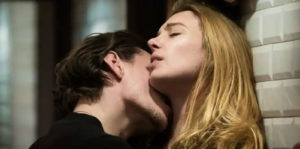
Simple Passion, directed by Danielle Arbid, tells the story of a couple’s sexually-driven relationship. Hélène (Laetitia Dosch) is a passionate individual with a lot to offer the world, who has fallen in love with a Russian diplomat, Aleksandr Svitsin (Sergei Polunin). Unfortunately, the two have little in common, and Aleksandr feels he has more important things to worry about than her. Throughout their intense affair, Hélène’s beliefs about herself will be challenged, as she struggles to come to terms with her changing identity, but will that change be for the better?
Dosch’s approach to Hélène allows her to be believable every moment of her performance. The romantic drama, written by Arbid and Annie Ernaux, relies heavily on whether or not Dosch is able to convince audiences of her character’s troubles and emotional plights as a result of there not being an abundance of substance. In this regard, the actor is most successful.
While sex is an intimate act, it can mean a number of different things. It can express passion and love, simply be pleasurable, or be used as a way to exert power and dominance. Simple Passion wraps each of these reasons into one uncomfortable montage of sex, lust, and emotional struggle. Viewers watch Hélène and Aleksandr be carnally affectionate with one another in graphic fashion but not fully understand the gravity of what is occurring. This is where the importance of Pascale Granel’s cinematography comes into play.

“Hélène…has fallen in love with a Russian diplomat…”
There are fine lines drawn in the sand between the various uses of sex at different points, and without Granel’s ability to capture the essence of each scene, the emotional intimacy would be lost. The blocking avoids directly showing the actors’ facial expressions, capturing only the sexual attributes of each character. We also hear the uncomfortable but necessary sounds of their encounters which brings the depth of each scene to life, and the film is better off as a result.
But, the thing that resonates most with viewers is the immense sadness that transcends the entirety of Simple Passion. From the opening moments of Hélène is sad. That sadness is deafening and heartbreaking, and audiences will see a part of themselves up on the screen, as everyone understands such a crippling emotion. As Hélène’s psyche and arc develop, her sadness changes to a degree, but it never fully dissipates. I was lured in by this sentiment, and it kept a stranglehold on me throughout the movie as I contemplated the emotional parallels between Hélène and myself.
My issue is that there isn’t much content beyond the emotional pull of the main character’s struggles. I’m not quite sure that what is there is enough to warrant an hour and forty-minute runtime. I feel like there needs to be more outside of the sex to physically and visually express what Hélène is experiencing, but, sadly, there isn’t enough there.
Sex is the vehicle by which Arbid tells her story, and, at certain points, that’s enough. Despite the excellent cinematography and wonderful acting, it’s the sex that kept me engaged. These scenes are modern, fun, edgy, and are developed in a way that appeals to all. Yes, there is a lack of real substance throughout Simple Passion, but the sex manages to fill that void to a degree and keep the film afloat. There are many moving pieces and some things that don’t necessarily work so well, but all-in-all, I believe that the movie checks all the boxes necessary to call it a success.

"…excellent cinematography and wonderful acting..."


